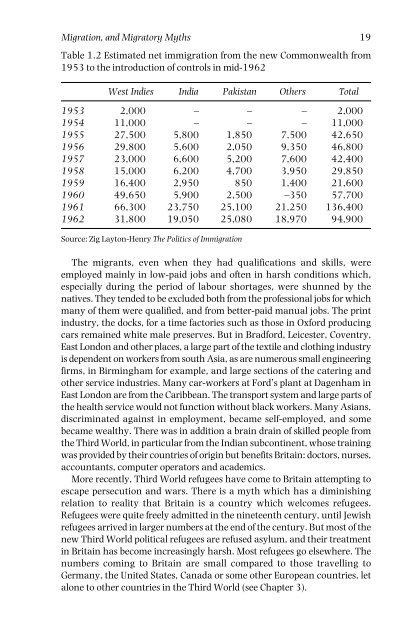Open%20borders%20The%20case%20against%20immigration%20controls%20-%20Teresa%20Hayter
Open%20borders%20The%20case%20against%20immigration%20controls%20-%20Teresa%20Hayter
Open%20borders%20The%20case%20against%20immigration%20controls%20-%20Teresa%20Hayter
You also want an ePaper? Increase the reach of your titles
YUMPU automatically turns print PDFs into web optimized ePapers that Google loves.
Migration, and Migratory Myths 19<br />
Table 1.2 Estimated net immigration from the new Commonwealth from<br />
1953 to the introduction of controls in mid-1962<br />
West Indies India Pakistan Others Total<br />
1953 2,000 – – – 2,000<br />
1954 11,000 – – – 11,000<br />
1955 27,500 5,800 1,850 7,500 42,650<br />
1956 29,800 5,600 2,050 9,350 46,800<br />
1957 23,000 6,600 5,200 7,600 42,400<br />
1958 15,000 6,200 4,700 3,950 29,850<br />
1959 16,400 2,950 850 1,400 21,600<br />
1960 49,650 5,900 2,500 –350 57,700<br />
1961 66,300 23,750 25,100 21,250 136,400<br />
1962 31,800 19,050 25,080 18,970 94,900<br />
Source: Zig Layton-Henry The Politics of Immigration<br />
The migrants, even when they had qualifications and skills, were<br />
employed mainly in low-paid jobs and often in harsh conditions which,<br />
especially during the period of labour shortages, were shunned by the<br />
natives. They tended to be excluded both from the professional jobs for which<br />
many of them were qualified, and from better-paid manual jobs. The print<br />
industry, the docks, for a time factories such as those in Oxford producing<br />
cars remained white male preserves. But in Bradford, Leicester, Coventry,<br />
East London and other places, a large part of the textile and clothing industry<br />
is dependent on workers from south Asia, as are numerous small engineering<br />
firms, in Birmingham for example, and large sections of the catering and<br />
other service industries. Many car-workers at Ford’s plant at Dagenham in<br />
East London are from the Caribbean. The transport system and large parts of<br />
the health service would not function without black workers. Many Asians,<br />
discriminated against in employment, became self-employed, and some<br />
became wealthy. There was in addition a brain drain of skilled people from<br />
the Third World, in particular from the Indian subcontinent, whose training<br />
was provided by their countries of origin but benefits Britain: doctors, nurses,<br />
accountants, computer operators and academics.<br />
More recently, Third World refugees have come to Britain attempting to<br />
escape persecution and wars. There is a myth which has a diminishing<br />
relation to reality that Britain is a country which welcomes refugees.<br />
Refugees were quite freely admitted in the nineteenth century, until Jewish<br />
refugees arrived in larger numbers at the end of the century. But most of the<br />
new Third World political refugees are refused asylum, and their treatment<br />
in Britain has become increasingly harsh. Most refugees go elsewhere. The<br />
numbers coming to Britain are small compared to those travelling to<br />
Germany, the United States, Canada or some other European countries, let<br />
alone to other countries in the Third World (see Chapter 3).


